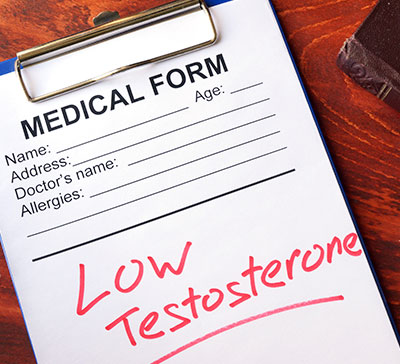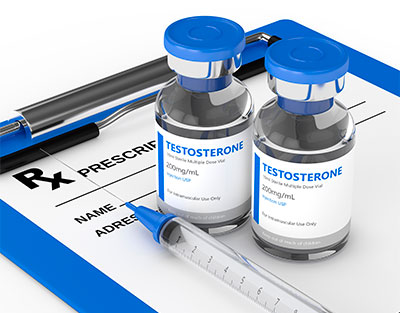What is Testosterone Deficiency?
Testosterone is a critical hormone for both men and women. Testosterone is generally recognized as a “male hormone.” It controls all of the physical features we associate with “maleness” – larger muscles, facial hair, deeper voice, etc. However, women make and need testosterone as well, but in significantly smaller amounts than in men.
In both men and women, testosterone is an extremely critical hormone for your overall health and vitality. Testosterone influences your ability to build muscle. It also strengthens your bones, regulates your ability to burn fat, and is critical to sexual desire and sexual function in both men and women.
Testosterone Deficiency Syndrome, also known as “Hypogonadism,” is a condition in which your body does not produce sufficient testosterone. The condition may simply be referred to as having a “testosterone deficiency” or “low testosterone.”
There can be several causes of testosterone deficiencies, such as injury to or disease of the testes or pituitary glands, certain cancers, or genetic conditions. Some medications can also lead to a testosterone deficiency, as can stress, obesity, or alcohol abuse.
However, the most common cause of testosterone deficiency is simply the natural drop in testosterone levels as you age.
A testosterone deficiency is when your body does not produce enough testosterone.
Age-Related Testosterone Deficiency in Men
While there can be many reasons for testosterone deficiency, the condition primarily affects older men. This is because once a man is over 30, the level of testosterone in his blood starts to drop significantly. This type of age-related testosterone deficiency in men is similar to menopause in women. It is, therefore, sometimes referred to as "andropause."
However, unlike menopause, which happens at a specific time in a woman’s life, andropause in men develops more slowly over time. Once a man is over 40, his testosterone level will drop by as much as 1 or 2% per year. By age 70, the average man’s testosterone production is about half of what it was in his 20s.
Testosterone levels are measured in nanograms per deciliter (ng/dL). Typically, the normal range is 300 to 1,000 ng/dL. Anything below 300 ng/dL is considered low testosterone.
Signs and Symptoms of Testosterone Deficiency in Men
In men, testosterone deficiency impacts three major areas of life: your physical wellbeing, your emotional wellbeing, and your mental acuity. Below are some of the common and less common specific signs and symptoms of testosterone deficiency in men.
Common Symptoms
Some of the most common signs and symptoms of testosterone deficiency and why they occur include:
Erectile Dysfunction
- Testosterone is a precursor to the release of nitric oxide during sexual arousal, which starts several reactions that result in an erection.
Hair Loss
- Men tend to lose hair as they age. While typical “male pattern baldness” is genetic, some hair loss can also be the result of age-related testosterone decline.
Reduced Bone Density
- Testosterone helps to produce bone tissue and maintain bone mass and density.
Sleep Problems
- Patients with low testosterone report difficulties in falling asleep or staying asleep. This could be because low T can lead to obesity, which can lead to sleep apnea.
Lowered Libido
- Men with testosterone deficiency experience a decrease in sex drive or libido. One of the most common symptoms of low testosterone in men is a loss of interest in sex.
Loss of Lean Muscle
- Testosterone plays a role in the development of muscle mass. Testosterone deficiency often results in significant loss of muscle mass.
Less Common Symptoms
Some of the less common or rarer symptoms of testosterone deficiency in men can include:
- Reduced testicle size
- Reduced semen volume
- Reduced or lack of beard growth
- Breast development (gynecomastia)
- Infertility
Age-Related Testosterone Deficiency in Women
Women, as well as men, experience age-related testosterone deficiency. In women, testosterone deficiency is closely tied to the other hormone loss they experience just before, during, and after menopause. In fact, research now suggests that the most debilitating symptoms of menopause – low libido, hot flashes, and night sweats – are related more to loss of testosterone rather than of estrogen.
Signs and Symptoms of Testosterone Deficiency in Women
Common Symptoms
The most common symptoms of testosterone deficiency in women are related to menopausal symptoms, such as:
- Hot Flashes
- Night Sweats
- Vaginal Dryness
We used to think that loss of estrogen was responsible for the hot flashes, night sweats, and sexual health issues experienced by menopausal women. We now know that these and many of the debilitating symptoms of menopause are more likely caused by testosterone deficiency in women.
Some of the other more common symptoms of testosterone deficiency in women are the same as in men, such as:
- Decreased energy
- Loss of bone density
- Weight gain
- Reduced sex drive
- Loss of muscle/muscle weakness
- Changes in mood
- Depression and anxiety
- Memory loss and other cognitive difficulties
Less Common
Some of the less common signs and symptoms of testosterone deficiency in women include:
- Increased “bad” cholesterol levels
- Loss of red blood cells (anemia)
- Decreased sexual satisfaction
- Fertility issues
- Sleep disturbances
- Irregular menstrual cycles
- Sluggishness
Are There Other Negative Impacts of Untreated Testosterone Deficiency?
Besides the signs and symptoms above, testosterone deficiencies can cause other negative effects on your health and wellbeing, such as:
- Increased risk of cardiovascular disease
- Increased risk of death from a cardiovascular event
- Increased risk of metabolic syndrome: high blood pressure, elevated insulin levels, excess belly fat, and abnormal cholesterol levels
- Strong association with diabetes
- Strong association with atherosclerotic disease of the aorta
- Higher incidence of prostate cancer
- Association with more aggressive variants of cancer
The only way to determine if you have a testosterone deficiency is to have your testosterone levels tested. This is usually done with a simple blood test. In addition to having your testosterone level tested, your doctors will take a complete medical history and do a thorough medical exam before offering a diagnosis of low testosterone.
Both men and women can suffer from testosterone deficiency or low testosterone.
How Are Testosterone Deficiencies Treated?
If you are diagnosed with a testosterone deficiency, the only effective treatment is testosterone replacement therapy. Testosterone replacement therapy raises the body’s testosterone levels through regular administration of testosterone. Testosterone therapy is only available with a doctor’s prescription.
Testosterone replacement therapy can be given in a number of forms, such as creams, topical gels, skin patches, subdermal pellets, or injections. Our doctors have found intramuscular testosterone injections to be the most effective form of testosterone replacement. Testosterone injections are usual prescribed for six-months. After your first six months of testosterone replacement, you will be evaluated to determine if continued therapy is needed.
Studies have shown that testosterone replacement therapy provides a wide range of benefits for men and women with testosterone deficiencies. Such benefits include improved libido, mood, cognition, muscle mass, bone density, and red blood cell production. Some of the other benefits of testosterone replacement include:
- Increased energy and vitality
- Increased ability to build lean muscle
- Weight loss, particularly stubborn belly fat
- Improved ability to focus and other cognitive improvements
- Increased strength
- Improve sleep
- Healthier skin, hair, and nails
- Stronger bones
In addition, testosterone replacement therapy may reduce the risk of diabetes and some cancers, as well as lower your risk of stroke or heart attack.
Testosterone therapy can make you feel younger, stronger and improve your overall quality of life.
Now that you know a lot more about how testosterone deficiencies affect men and women, why not take a minute to contact us and learn more about how hormone replacement therapy can improve your quality of life?




